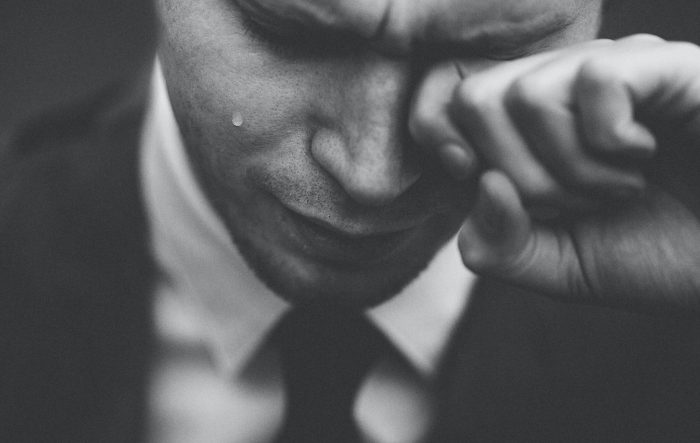We hear the phrase “man up” all the time, but what does it mean? What does it mean to be a man?
In socio-psychological discourses, masculinity is often associated with logic, reason, and power, whereas femininity is mostly associated with feelings, creativity, and compassion.
Therefore, the phrase “man up” implies that we are to adopt a form of stoical behaviour that suppresses our emotionality. But this dichotomous thinking is not so straightforward, for we are each both masculine and feminine, which is part of the richness of our being.
And so why do we deny some of those aspects of ourselves?
Because it’s “uncool” for men to express emotion, isn’t it? In fact, it’s unmanly for men to have feelings, let alone show them or talk about them, right? Wrong.
In a patriarchal culture, emotions are synonymous with weakness: men are educated in denying or repressing their feminine side in order to protect their ego—their manliness—so that we, in turn, run and hide from our feelings out of shame or fear. But what are we afraid of?
Judgment.
If we don’t conform to the masculine stereotype—if we appear too feminine—then our families, our friends, our peers, or even strangers may judge us as weak and effeminate: we are afraid of what others think at the risk of being outcast from our tribe, branded differently, and so we seek the safety of social conformity and in turn fulfil society’s expectations, thereby perpetuating the stereotype.
But in doing so, we deny or even repress our feelings rather than expressing them: we wear masks rather than being true to ourselves because to wear our emotions—including our insecurities—on our sleeve means being vulnerable, which in the eyes of a patriarchal society is tantamount to weakness.
In all honesty, opening myself up in writing this blog meant being vulnerable, and I had my reservations about it, which just goes to show how much I’ve been indoctrinated by the patriarchal bullsh*t.
But where did this bullsh*t come from?
Masculine identities are cultural fabrications created by generational attitudes—including our erroneous and damaging history of prejudice, stereotyping, and gender inequality—that gradually become ingrained as cultural conventions and are instilled in us in our socialisation. All of this is perpetuated, of course, by the all-powerful media, which itself is androcentric.
We are judged by everyone: by our colleagues, our families, our social circles; by both the men and women we encounter because the false conceptions of manhood that have been force-fed to us are part of women’s socialization, too, just as our conceptions of femininity have been fabricated, inherited, and perpetuated.
As a result, we unknowingly fulfil male stereotypes in order to be attractive to the opposite (or same) sex. We look at images of buff guys and assimilate it as the ideal or what others desire in a man. Physical strength is lauded over intellect and emotion—superficial appearance is everything, it would seem.
This belief is kept alive on social media in the form of selfies that draw attention to our bodies rather than focusing on our minds and, more daringly, our feelings.
I am no exception. I have succumbed to the same bullsh*t.
Throughout my adult life, I have struggled with low self-esteem. I was never popular at school, especially with the opposite sex. I was teased for being brainy, which was uncool and, on reflection, the reason why I was rejected by girls.
I associated that rejection with ugliness, and so I perpetuated a vicious cycle by focussing on nurturing my intellect to compensate for what I lacked in physical appearance. Studying and achieving good grades was a form of self-valorisation, for it proved to myself that I was good enough in spite of my ugliness and unpopularity.
But this lack of self-worth, coupled with a feeling of not fitting in, soon translated to my body. As a teen, I was anorexic. I associated attractiveness with being skinny, and my unhealthy relationship with food became a means by which I felt I had some sense of power over myself, or at least over my body: self-denial meant I was in control, right? Wrong.
I was delusional, for the voice in my head who told me I was ugly (and resulted in depriving myself of food) was the same voice who told me I wasn’t good enough.
After several years of suffering from this demon, I got tired of feeling ugly both on the inside as well as on the outside, and I turned to weightlifting as my therapy. Building my body gave me confidence as if muscle mass were somehow an externalization of growing inner confidence. Did it work?
Yes, to an extent. I now lift weights because I choose to and because I love it; I no longer do it out of some need to prove myself or my inner worth. It took a lot of self-exploration and inner healing to get to this place, and it entailed a lot of honesty and vulnerability, which is, of course, what so many men are afraid of.
I don’t know if I will ever outrun my demons, but learning to understand where they came from and empowering myself to think differently is a step in the right direction.
If our masculine identities are constructed through patriarchal ideologies and discourses, then what defines patriarchy? Simply put; power, the attainment, and preservation of dominance and control. In this instance, power equates to ego, which is part of our survival mechanism—the survival of the fittest, the survival of the strongest, the survival of the most powerful. But at the very heart of this desire for power is fear: the fear of losing that power.
The paradoxical thing about paradigms built on power is that those paradigms perpetually shift.
For example, the physicality of a man has changed massively over recent decades. Once upon a time, in my living memory, the action hero stereotype—portrayed in the movies by the likes of Arnold Schwarzenegger, the embodiment of strength and power was en vogue and seemingly defined masculinity, whereas these days it’s not so much muscles as tattoos and big beards that are associated with manliness.
Although it should be said that some gender stereotypes are being redefined, as more and more women have body art, which is refreshingly progressive.
But what happens when bushy beards are no longer fashionable? The paradigm shifts, the stereotype changes, and we all follow suit like automata.
We, therefore, need a definition of manliness that is real, not transient; a version of masculinity that is from the heart and speaks our truth; and what’s more real than breaking down preconceived, erroneous, and damaging beliefs and perceptions about what makes a man?
By conforming to social expectations and by fulfilling social stereotypes, we are not powerful; rather we perpetuate the power of patriarchy, and subsequently, us, blokes, are stuck with the shifting stereotypes of manhood and inwardly lost in fear of judgment for not living up to them.
How do we break from the patriarchy that we, as a society, have inherited but no longer wish to be a part of?
At what point do we take control in shaping our own identity?
How do we take our power back?
By being our own judge, but more importantly, to judge our self-worth according to our own values and principles, and not by some external standard or expectation.
To be truly powerful means to be authentic, which means opening our hearts, expressing our feelings, and owning our insecurities.
We need to embrace our feminine side, for that is where our creativity and compassion resides, and by doing so, we can articulate our inner depths with transparency and insight.
Self-exploration and self-expression are vital to living an emotionally healthy life, and it is vital to nurturing emotionally healthy relationships. The only way to live with authenticity is to own and express our feminine aspect, which means owning and expressing our feelings.
Indeed, men want security and love just as much as women do, and (some) men want to connect with their partner on a deep, intimate, soul level. The problem is that some men don’t admit it or pretend otherwise, and as a result, make themselves emotionally unavailable, which can lead to all manner of interrelationship issues.
Indeed, emotional suppression is not only stifling our self-expression and creativity; it is also dangerous, for our feelings may manifest in emotional outbursts of anger or even violent behavior.
If manliness is associated with power, then that idea of power is egocentric. True power is the ability to positively influence and inspire others, and with this understanding of true power, we find that the most powerful men in our history are those who spoke, who acted out of selfless love and with compassion: Martin Luther King Jr., Mahatma Gandhi and the like are men who spoke their truth and were not afraid to do so.
But whilst their vision was one of inclusion and integration on a societal, even global scale, how might we change our perception of masculinity on a personal level?
In order to be truly integrated, internally, and in order to live with authenticity, we must embrace both our masculine and feminine aspects. The way to do this is to stop running, stop hiding, and start owning our feminine side, for this is how we achieve balance, both physically and emotionally.
It is also how we build strong, healthy, inclusive relationships, but first, we must first be healthy and whole within ourselves.
And so, if our identities of manhood are fabricated by patriarchy out of fear, and if we perpetuate those identities out of fear of judgment, then the way to take our power back is to live with feeling, unashamedly, and unapologetically.
Why hide how we feel?
Why deny what we truly seek?
Why pretend to be something we are not?
We all have insecurities, so why kid ourselves otherwise? Being unafraid to be vulnerable is real strength, and being true to ourselves is real power.
So, from a mindful and empowered mindset, what “man up” truly really means is this: embrace your emotions, be yourself, and speak your truth.
Being authentic is the most powerful thing you can possibly be.
~









Read 5 comments and reply